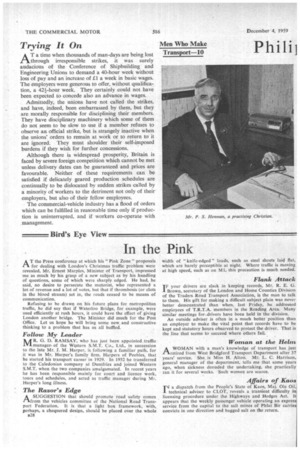Trying It On
Page 34

If you've noticed an error in this article please click here to report it so we can fix it.
AT a time when thousands of man-days are being lost through irresponsible strikes, it was surely audacious of the Conference of Shipbuilding and Engineering Unions to demand a 40-hour week without loss of pay and an increase of El a week in basic wages. The employers were generous to offer, without qualification, a 421-hour week. They certainly could not have been expected to concede also an advance in wages.
Admittedly, the unions have not called the strikes, and have, indeed, been embarrassed by them, but they are morally responsible for disciplining their members. They have disciplinary machinery which some of them do not seem to be slow to use if a member refuses to observe an official strike, but is strangely inactive when the unions' orders to remain at work or to return to it are ignored. They must shoulder their self-imposed burdens if they wish for further concessions.
Although there is widespread prosperity, Britain is faced by severe foreign competition which cannot be met unless delivery dates can be guaranteed and prices are favourable. Neither of these requirements can be satisfied if delicately geared production schedules are continually to be dislocated by sudden strikes called by a minority of workers to the detriment not only of their employers, but also of their fellow employees.
The commercial-vehicle industry has a flood of orders which can be fulfilled in reasonable time only if production is uninterrupted, and if workers co-operate with management.
























































































































